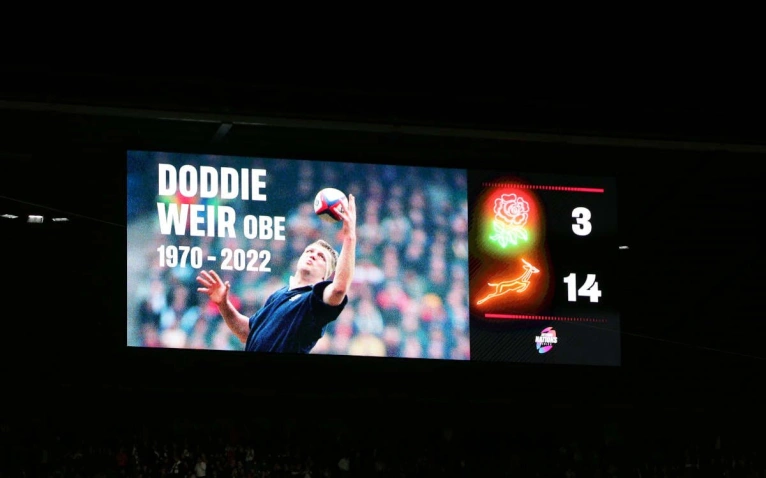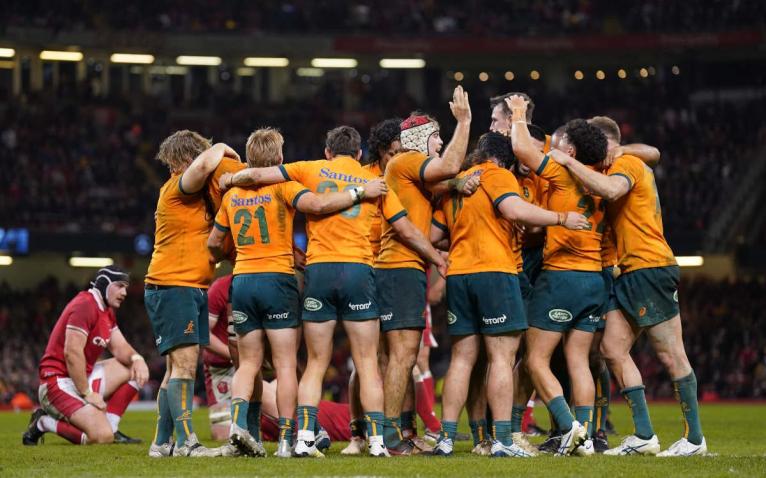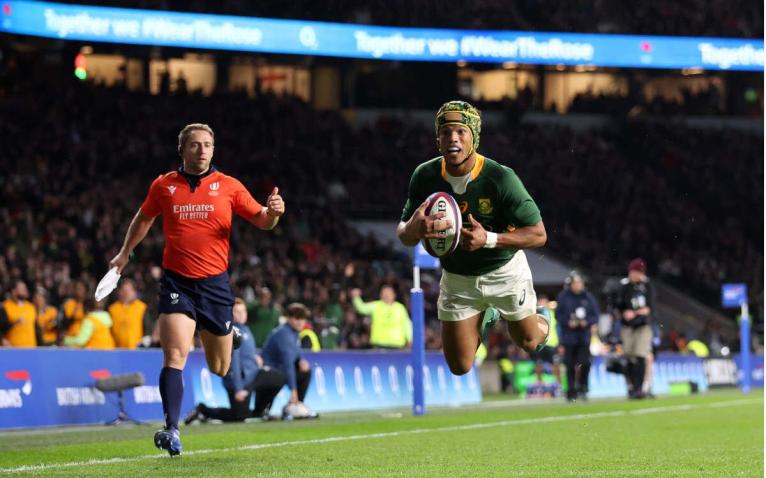The Autumn Series wrapped up with victories for South Africa and Australia and plenty of questions for coaches of England and Wales, who were found wanting after disappointing campaigns. All of this was put in perspective by the sad loss of Doddie Weir on Saturday. A larger-than-life personality that transcended rivalries, he will never be forgotten. Here’s what RugbyPass+ made of the action…
Eddie loses the audience
The RFU have one stated aim for its national team. Namely to win a World Cup. They have stuck with Eddie Jones for seven years, in which, to his credit, he has led England on a 17-Test winning run, won a Grand Slam in 2016, and reached a World Cup final in 2019.
For many who watched his England side huff and puff and not lay a glove on a depleted South Africa – shorn of Thomas du Toit to a red card on 60 minutes – they are now openly pondering whether Jones has improved his squad in the three years since Yokahama, or regressed at a worrying pace.
This calendar year, England have won five games out of 12. Sliced another way, it’s a 42 per cent win record (Jones’ paymasters have stated their aim is 80 per cent). Compare that to France’s 100 per cent and Ireland’s 82 per cent, then they’re way off being contenders.
Bill Sweeney, the RFU chief executive, has said “overall results are not where we expect them to be”, but Jones is continuing to implore those still listening that everything is on track and that “takes the blame for the poor results”. Witty and acerbic, Jones’ missives have routinely kept the public and the press pack at bay, but many are questioning whether there is much substance to his bluster.
The questions are mounting. Has Jones improved the players he’s worked with? Why couldn’t he get a tune out of Tom Curry, Maro Itoje and an off-colour Owen Farrell, all British and Irish Lions, and all deemed world-class players? Has Manu Tuilagi’s magic sheen worn off as he was shackled comfortably by an aggressive South African defence? Why did the English ‘bomb squad’ of Ellis Genge, Luke Cowan-Dickie and Will Stuart get obliterated by Malcolm Marx, Frans Malherbe and Steven Kitshoff? As for selection, how long have we got?
A year ago, the Springbok pack bullied England, bending them to their will in the scrum but came off 27-26 losers. Jones, spouting the usual hyperbole, promised to beef up his pack and go toe-to-toe with the South African eight, but if anything, the visiting pack was more dominant than ever. Out wide was a concern too, as Jones admitted that his backs had “lost the air”.
Nine months out from France, if England are to beat the Boks, it has to be with a plan B, a more expansive game, but this year they are averaging just over two tries a Test, and didn’t cross the whitewash against New Zealand or the Boks for 71 minutes. It seems the miraculous 19-point recovery against the All Blacks gave Jones a false sense of progress.
So what does this all mean? Well it is wholly unlikely that the RFU pushes the nuclear button and sack him, which would be hugely expensive – this at a time when the union is under scrutiny for its poor management of the domestic game, as witnessed by Sweeney’s appearance at the DCMS earlier this week – but the fans are growing restless and the usual suspects – Matt Dawson and Sir Clive Woodward – are sharpening their pencils to cast doubt on Jones’ empty World Cup rallying cry. A turnaround is required otherwise the wait for English rugby to replicate Jonny Wilkinson’s famous drop-goal will extend to 24 years. For the richest union in the world, with the biggest player base, that has to count as a failure.
Doddie Weir’s legacy must be kept burning
Since the news of Doddie Weir’s desperate passing broke on Saturday evening, giants of the game have lined up to pay tribute to one of their own. Jim Telfer, Martin Bayfield, Gregor Townsend, Scott Quinnell, Stuart Hogg, Jason Leonard, Martin Johnson, Scott Hastings, Will Carling, Brian Moore, Sir Ian McGeechan have offered their memories and their shared their grief. Tributes flowed from beyond rugby too – from JK Rowling, Alastair Campbell, Sir Chris Hoy, John Hartson, Eve Muirhead, Steph Houghton, Fred McAulay, the Prince and Princess of Wales, and Rishi Sunak, the prime minister, all united in sadness and love. Seldom, indeed perhaps never, has rugby seen such a torrent of emotion.
Weir, it should be remembered, was a fine rugby player. His 61 Scotland caps, title with Newcastle Falcons and selection for the fabled British and Irish Lions tour of 1997, attest to that. So do Telfer and McGeechan.
But as a character, invariably plastered in bright tartan, it was Weir’s joy and humour that endeared him to almost everyone he met, that brought hilarity wherever he went, from television studios and corporate hospitality suites to farmyard barns septic tanks.
For six years, Weir attacked motor neurone disease with vivacity, dignity and at times, anger. His My Name’5 Doddie Foundation has raised over £8m for MND research. He has criticised the government for failing to deliver promised funding and science for moving too slowly in developing medicines.

He refused to wallow. He mobilised an entire sport and sent it in to battle against a foe he knew he would never defeat. He was determined to live life to the fullest and even more determined to pour everything he had into his fight, at times defying doctors’ expectations.
“I’m maybe lucky that I’ve been given the card to give [MND] a battle,” Weir once said.
His death, at 52, hits like a gut-punch. To those who loved and knew him, and to the many, many thousands more who were made to feel like they knew him. To the fellow MND sufferers for whom he has provided a source of towering inspiration and tangible funds.
When the grief subsides, responsibility lies with rugby’s authorities to keep his memory and his mission burning. A trophy in Weir’s honour already exists, but more could be done with it. An annual match to raise money for the foundation. A ‘Doddie Weir Stand’ at Murrayfield has been mooted, and few would be more deserving of such permanent distinction.
Weir was a totem of strength, a beacon of light. An inspiration so far beyond the parameters of sport. The world will be a darker place without his tartan-encased vibrancy. His legacy will endure in the millions he raised, the lives he changed, and the quest to cure this heinous disease.
Australia, 2023 World Cup finalists, you read it here first
Winners of just five games from 13 this year, if you were ranking the world’s best sides, you could put together a case that Australia should be placed as low as eighth. It just wouldn’t be a very convincing one.
While results have been poor, performances have sometimes been decent. They outplayed flavour of the month, Ireland, should have won and could have drawn had they opted for a kick at goal in the dying moments of that match rather than show ambition by going for the lineout and a win.
It didn’t come off but in defeat sometimes there is honour. The Wallabies won some that day and again when they visited Paris, losing at the death to France, after they had lead most of the way, playing some brilliant rugby.
We could go on. They lost eight times this year but six of those defeats were by slim margins: eight points (England), four points (England), three (Ireland), two (New Zealand), one (France) and one (Italy).
Ah, Italy. Surely there is no excuse for that one? Well, there is. It was the Australian B team, not their front-liners, a side put together amid an injury crisis mid-tour. While their coach, Dave Rennie, has been under pressure, his team showed admirable spirit on Saturday to retrieve a hopeless situation against Wales and rattle off 26 unanswered points in the final 22 minutes. You don’t sack a coach after that, well, certainly not the winning coach.
“The Australians fighters, tough like cowboys, and have players that come from southern lands that have a decent culture,” the France coach, Fabien Galthié said, at the start of this month.

“They can be behind by 20 points and remain capable of turning the situation around.”
We saw as much in Cardiff on Saturday. Now bear in mind three things: one, they’ve had an injury crisis yet still managed to beat Wales and Scotland away, push France and Ireland to the brink. Two, their discipline has been shocking in 2022, the worst of all the leading nations, an ‘honour’ that used to belong to France. That’s fixable.
Now, point number three. A path to a World Cup final is theirs to grab. Wales, Fiji and Georgia are in their pool. It is Australia’s to lose. Should they win it – and how can they not? – then it is a quarter-final against the runners-up in a pool containing England, Argentina or Japan.
Still with us? A semi-final awaits against one of New Zealand/South Africa/France/Ireland. That’s clearly where many feel the show will stop. Except the date of the semi-final is six days after the quarters. Remember the 2019 World Cup and how emotionally spent the All Blacks were after beating Ireland in the quarters and how England were similarly hungover after their victory against New Zealand?
That’s the possibility/opportunity facing the Wallabies 11 months from now. Imagine if they have Will Skelton fit and firing then; imagine if they have the gumption to lower their penalty count. Imagine them in a World Cup final? It isn’t hard to.
You gotta go there to come back
It’s been nearly two months since Cardiff lost to the Lions at the Arms Park and a group of players were accused of letting the club down with their unruly behaviour in a residential pub in the city. What actually transpired on the evening was largely kept in-house, and save for a few rumours and an internal disciplinary, the club has moved on.
Whatever was said in those tense hours after the public outcry must have hit the mark because Dai Young’s men have won four out of five of their games, and now lie in fifth place, as the highest placed Welsh region. What has been notable is two of the sides have been South African. They beat URC champions, the Stormers, in the capital, and in one of the most unlikely results of the season to date, they trounced the Sharks in Durban 35-0 with a bonus point secured early in the second half, in some truly Welsh weather, to leave owner Marco Masotti surely incandescent.
It was a result to lift the spirits of Welsh sports fans after World Cup agony and international ridicule, having thrown away a 22-point lead to Australia.
Young also achieved it without Dillon Lewis, Taulupe Faletau, Tomos Williams and Josh Adams, who were on Test duty, while Liam Williams is out with the long-term injury.
If you forget individual brilliance, their renaissance has been down to hard work and belief, led by the talismanic Josh Turnbull and a few players keen to show Wayne Pivac what he’s missing, with Rhys Carre, inexplicably left out of the Autumn Series, to the fore, and back-rows James Botham and Thomas Young, especially, showing their value.
There is also a smattering of gifted youngsters in Ben Thomas, Theo Cabango and Mason Grady, all local boys, who could serve the club well for a decade to come.
So long a soft touch, Cardiff now have some momentum, and it seems reaching their nadir early on may just have saved their season.
Boks moving with ominous intent
Winning autumn fixtures is huge, of course, but a year out from the World Cup, strengthening a player pool, tinkering with combinations, testing depth and seeing how it holds is almost as important.
In that respect, South Africa have emerged from a bruising November schedule with boxes ticked and a mighty squad bubbling.
Let’s take fly-half for starters. No Handre Pollard, no Elton Jantjies, no Frans Steyn. Damian Willemse has hardly played any rugby at ten, never mind doing it against the world’s top teams in their own back yards, but with time in the saddle, by the end of the autumn, he looked assured, and frequently dangerous. Manie Libbok, the Stormers pivot, emerges with credit too.
If we move out a little to midfield, Jacques Nienaber was shorn of Lukhanyo Am, one of the game’s very greatest players of the past three years, at outside centre. That is a grievous blow, for Am is a brilliantly astute, technically superb operator in a seriously hard position. Step forward, Jesse Kriel. Often maligned, Kriel shone. He will never possess Am’s attacking nous, but his defensive reads and brutal hits proved telling over and over.
In the back-three, Kurt-Lee Arendse has been such an incredible force that it is hard to see how Makazole Mapimpi can oust him from the starting line-up, let alone how Sbu Nkosi or Aphelele Fassi might force their way back in. Arendse racked up five tries in four November fixtures, the coup de grace a glorious bamboozling of Marcus Smith at Twickenham.

Up front, Evan Roos carried like a titan on Saturday. At best, he is South Africa’s third-choice number eight. Probably, he is fourth in the pecking order behind Duane Vermeulen, Jasper Wiese and Kwagga Smith. Roos would be top dog for many other nations. So would Marcell Coetzee, for whom the international ship seems to have sailed. That in itself tells a stark story.
In the continued absence of RG Snyman and after yet another shoulder injury to Lood de Jager, Franco Mostert was terrific. Siya Kolisi and Eben Etzebeth, two enormous stalwart figures, maintained their unstinting excellence. And we haven’t even mentioned the feared ‘bomb squad’.
The Springboks’ systematic dismantling of England, missing a host of front-liners, was masterful. They lost nail-biters in Dublin and Marseille against the strongest contenders for next year’s showpiece, but Nienaber will be unperturbed. He has seen his game plan develop and peripheral figures come roaring to the fore. He knows, when the chips are down and big men have fallen, he can go to his squad and trust what he has. That is deeply encouraging for South Africa and deeply ominous for the rest of the rugby world.
MUNSTER – REBORN OR DYING?
Graham Rowntree made a telling comment after Munster’s narrow win over Connacht on Saturday. Asked about their date with Toulouse on Sunday week, he corrected the questioner. “We have Edinburgh this Friday; we won’t talk about the Champions Cup this week at all. Seriously!”
Not too long ago, no one would have taken him seriously. As a club, Munster are built on two pillars, European Cup rugby and tales of yore from victories over touring heavyweights. Well, Rowntree restored some much-needed credit in the bank after becoming the first Munster coach to oversee a win over the Springboks.
“We didn’t get any points for it; I did ask for them, though!” he joked.
Five much-needed points arrived at the weekend and suddenly the URC table is not looking as miserable for them. They are ninth, four points off fifth. That’s the position they could end up in on Friday if they defeat Edinburgh and as high a position as they are likely to get by the end of this season, when you consider how few games they have left (ten) and how difficult four of those are (Ulster away, Sharks away, Stormers away, Leinster home).
It is why, for once, you could argue Munster’s URC season is as important to them as their Champions Cup one, for ithere is a real danger they could miss out on a spot in Europe next year unless they build on the momentum of Saturday’s 24-17 victory.
Rowntree knows as much. His predecessors all had a habit of resting players the week before their European campaign kicked off. That luxury isn’t there for Rowntree. Two wins, even if one was an unforgettable night against South Africa, aren’t enough to rescue a season.
They only have to glance over the fence to see how far they’ve to go. Leinster already have 38 points on the board, exactly twice as many as Munster have right now. Last season 50 points earned you a place in the URC play-offs. In more ways than one, Munster still have a long way to go.




"....to the many, many thousands more who were made to feel like they knew him..." I am one of that number. He was and is an inspiration to any of us who are struggling in adversity. RIP.